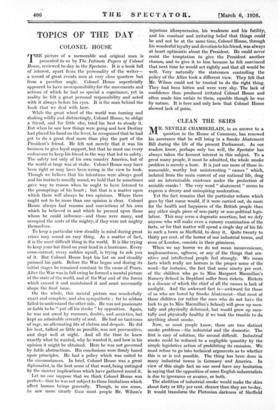TOPICS OF THE DAY
COLONEL HOUSE
THE picture of a memorable and original man is presented to us by The Intimate Papers of Colonel House, reviewed to-day in the Spectator. It is a book full of interest, apart from, the personality of the writer—. a record of great events seen at very close quarters but from a peculiar angle. Colonel House superficially appeared to have no responsibility for the movements and actions of which he had so special a cognizance, yet in reality he felt a great personal responsibility and acted with it always before his eyes. It is the man behind the book that we deal with here.
While the great wheel of the world was turning and shaking wildly and distractingly, Colonel House, to oblige a friend, and for little else, tried his best to steady it. But when he saw how things were going and how Destiny had placed his hand on the lever, he recognized that he had got to do a great deal more than play the part of the President's friend. He felt not merely that it was his business to give loyal support, but that he must use every endeavour to keep his friend in the way that led to safety. The safety not only of his own country America, but of the world at large was at stake. Colonel House may have been right or may have been wrong in the view he took. Though we believe that his intentions were always good and-his instincts usually sound, we hold that he sometimes gave way to reason when he ought to have listened to the promptings of his heart ; but that is a matter upon which there will always be two opinions. Where there ought not to be. more than one opinion is clear. Colonel House always had reasons and convictions of his own which he believed in and which he pressed upon those whom he could influence—and those were many, and occupied the seats of the mighty, if they were not mighty themselves.
To keep a particular view steadily in mind during great crises may sound an easy thing. As a matter of fact, it is the most difficult thing in the world. It is like trying to keep your hat fixed on your head in a hurricane. Every cross-current, every sudden squall, is trying to rob you of it. But Colonel House kept his hat on and steadily pursued his path. Before the War began and during its initial stages he remained constant to the cause of Peace. After the War was in full swing he formed a mental picture of the state of the world, and of the War and of the forces which caused it and maintained it and must necessarily shape the final issue.
On the whole, this mental picture was wonderfully exact and complete, and also sympathetic ; for he seldom failed to understand the other side. He was not passionate or liable to be " put off his stroke " by opposition. Again, he was not awed by rumours, doubts, and anxieties, but kept an admirable serenity of soul. He had no tantrums of rage, no alternating fits of elation and despair. He did his best, talked as little as possible, was not provocative, and slept well at night. And all the time he knew exactly what he wanted, why he wanted it, and how in his opinion it might be obtained. Here he was not governed by futile abstractions. His conclusions were firmly based upon' principles. He had a policy which was suited to the circumstances. In brief, Colonel House was a great diplomatist, in the best sense of that word, being untinged by the sinister implications which have gathered round it.
Let no one suppose that we think Colonel House was perfect—that he was not subject to those limitations which affect human beings generally. Though, in one sense, he saw more clearly than most people Mr. Wilson's injurious idiosyncrasies, his weakness and his futility and his constant and irritating belief that things could be and not be at the same time, Colonel House, through his wonderful loyalty and devotion to his friend, was always at heart optimistic about the President. He could never resist the temptation to give the President another chancev and to give. it to him because he felt convinced that 'next time he would act rightly and that all would be well. Very naturally the statesmen controlling the policy of the Allies took a different view. They felt that Mr. Wilson could not be trusted to do the right thing. They had been bitten and were very shy. The lack of confidence thus produced irritated Colonel House and often made him unfair to them, equable though he was by nature. It is here and only here that Colonel House showed lack of poise.






































































 Previous page
Previous page